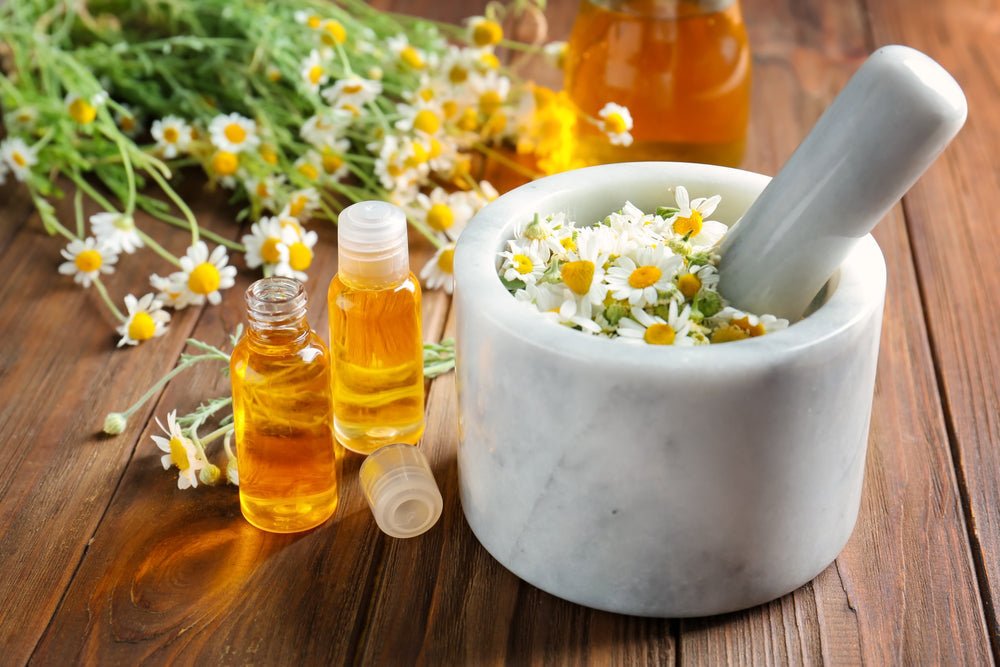Your cart is empty
Free shipping on all US orders


Free shipping on all orders

When is the last time you had some soothing chamomile tea? The answer to this is usually fairly recent, or never.
However, turns out it might be in your best interest to consume more of this miraculous herb.
Not only can it help put your mind at ease after a tough day, but it can even improve digestive health- and more much.
In this blog post, we will look at what makes it so useful, and why you might want to start taking it a bit more frequently.
Chamomile is a popular herbal remedy that has been used for centuries to treat a variety of ailments.
Chamomile is a flowering plant from the daisy family that has been used as an herbal remedy since ancient times. The two main types of chamomile that are most commonly used medicinally are German chamomile (Matricaria recutita) and Roman chamomile (Chamaemelum Nobile).
Chamomile is extracted via steam distillation from the flowers and leaves of the plant, creating an oil that can then be used for medicinal purposes.
Chamomile is a plant that contains a variety of active compounds, including flavonoids, terpenoids, and other chemicals. The specific constituents of chamomile may vary depending on the type of chamomile and how it is prepared.
Two of the main active compounds in chamomile are apigenin and chamazulene. Apigenin is a flavonoid that has been shown to have mild sedative and anxiolytic (anxiety-reducing) effects. Chamazulene is a chemical produced by steam distillation of chamomile and is responsible for the plant's distinctive blue color. It has been shown to have anti-inflammatory and pain-relieving effects.
Other active compounds in chamomile include:
It's important to note that the specific concentrations of these compounds can vary depending on the type of chamomile and how it is extracted and prepared. The therapeutic effects of chamomile may also depend on the specific combination and relative concentrations of these active compounds.
One of the main benefits of chamomile is its ability to support digestive system health. Chamomile's antispasmodic properties help to relax the muscles of the digestive tract and reduce symptoms such as bloating, cramps, and even constipation.

Studies have also shown that chamomile can help to reduce the effects of irritable bowel syndrome. Furthermore, chamomile has been found to reduce the symptoms of heartburn, acid reflux, and even ulcers.
The herb can also increase the production of enzymes involved in the digestive process with the end goal of better nutrient assimilation.
As you can see, its effects on digestive health aren't too shabby!
Another great benefit of chamomile is its ability to maintain skin health. Chamomile contains a range of antioxidants that protect skin cells from damage caused by free radicals. This can help to prevent signs of premature aging, such as wrinkles and age spots.
Chamomile is also known to help reduce inflammation and boost the skin’s natural healing processes, making it particularly effective in treating skin conditions like psoriasis and eczema.
Chamomile is one of the most widely used herbs in the world and with good reason. States of heightened anxiety are commonplace, especially considering the rapid pace the world moves at. It is understandable that people frequently develop anxiety, which may spiral into depression if left unchecked.

Chamomile acts as a natural anxiolytic, meaning that it can help to reduce the symptoms of anxiety and promote relaxation. Studies have shown that chamomile is just as effective as some pharmaceutical drugs in reducing symptoms of generalized anxiety disorder (GAD), making it an excellent natural remedy for those that may be apprehensive about taking prescription drugs.
Chamomile is a herb that has been used for centuries to promote sleep and relaxation. It is believed to work by increasing the levels of certain neurotransmitters in the brain, such as serotonin and GABA, which help to regulate sleep and mood.
One of the active ingredients in chamomile is an antioxidant called apigenin, which has been shown to bind to certain receptors in the brain that are involved in sleep regulation.
Chamomile has a very synergistic action when combined with other herbs and supplements that promote sleep, especially melatonin.
That's why we made DREAMZZZ; a non-habit-forming sleep aid to get you back on track when experiencing transient insomnia.
Another major benefit of chamomile is its ability to help strengthen the body's natural defense mechanism- the immune system.
Animal studies have found that chamomile extract has the potential to reduce markers of inflammation in the body, such as C-reactive protein (CRP). Furthermore, chamomile also contains flavonoids, which are powerful antioxidants known to protect cells from damage caused by free radicals - molecules that can ultimately impede the immune mediators.
In addition, some studies suggest that chamomile may play a role in stimulating the activity of certain immune cells such as T lymphocytes and B lymphocytes. These two types of white blood cells are responsible for recognizing and killing invading pathogens and stimulating other immune responses. By increasing their numbers, it is thought that chamomile may be able to help boost the body's overall immunity.
Finally, research has also suggested that chamomile may act as an immunostimulant - meaning it can stimulate the production of cytokines, which are molecules that regulate various aspects of the immune response. By activating these important signaling molecules, it is theorized that chamomile may be able to enhance the body’s response to infection or disease.
Did you know that the soothing cup of chamomile tea you take might even have cancer-preventing properties? Some studies have also suggested that chamomile may indeed have potential anti-cancer properties.
One potential mechanism by which chamomile may have anti-cancer effects is through its antioxidant activity. Antioxidants are compounds that can neutralize harmful molecules called free radicals, which can damage cells and potentially contribute to the development of cancer. Chamomile contains several antioxidants, including flavonoids and terpenoids, which may help to protect cells from damage.

Several in vitro and animal studies have found that chamomile extract or its individual components may have anti-tumor effects. For example, one study found that a chamomile extract inhibited the growth of human colon cancer cells in a laboratory setting.
Another study found that chamomile extract reduced the size of breast cancer tumors in mice. However, it is important to note that these studies were conducted in controlled laboratory or animal settings, so more research is needed to determine whether chamomile has similar effects in humans.
It is also worth noting that while chamomile may have potential anti-cancer properties, it is not a substitute for standard medical treatment for cancer. If you are concerned about cancer or are experiencing symptoms that could be related to cancer, it is important to consult with a healthcare professional for a proper diagnosis and treatment plan.
There is some evidence to suggest that chamomile may have a beneficial effect on blood sugar levels.
One potential mechanism by which chamomile may help to control blood sugar levels is through its anti-inflammatory effects. Inflammation has been linked to the development of insulin resistance, a condition in which the body's cells become less sensitive to insulin, leading to higher blood sugar levels. By reducing inflammation, chamomile may help to improve insulin sensitivity and lower blood sugar levels.
Chamomile may also have a direct effect on the pancreas, the organ responsible for producing insulin. Some studies have shown that chamomile may stimulate the production of insulin and increase the uptake of glucose by cells, which can help to lower blood sugar levels.
Chamomile's actions on the heart are numerous and multi-faceted. These include:
Chamomile may also be beneficial for women dealing with menstrual pain. The herb has long been used for its anti-inflammatory and analgesic (pain-relieving) effects, which could provide relief from the cramping associated with menstruation.
It may also reduce stress levels, which can further help to alleviate pain and other uncomfortable symptoms such as headaches and nausea. Additionally, chamomile may help to reduce other symptoms of menstruation such as fatigue and irritability.
Then there's the fact that chamomile also functions as a mild diuretic; promoting the excretion of excess fluid that may be causing uncomfortable bloating and cramping.
Chamomile is versatile and can be enjoyed by almost everyone. However, there are a few people who should not use chamomile tea. These include people who are allergic to members of the daisy family, individuals who are pregnant or breastfeeding, and people who are taking blood thinners or other medications. It is advised to consult with a doctor before drinking chamomile tea if you fall into any of these categories.
Chamomile is available in several forms, including:
-Dried Flower Buds
-Liquid Extract
-Powder Extract
-Capsules and Tablets
These different forms are all widely available in health food stores and online. Each form has its own set of pros and cons; for example, as a sleep aid and for the relief of anxiety or stressed states, DREAMZZZ capsules are convenient and effective.
One of the great things about chamomile is the fact that it's so safe. That means there's a large margin of safety and dosage range.
For instance, amounts as low as 200mg are enough to elicit benefit, especially when combined synergistically with other ingredients, but amounts as high as 5000mg have been researched.
Chamomile remains a safe, and effective herbal remedy with numerous therapeutic properties. Its uses extend way beyond its sleep-promoting and anxiety-relieving qualities, making it a surprise all-rounder.
Give it a try- either by itself or in a formulation with other ingredients for specialized use, you might just love it.